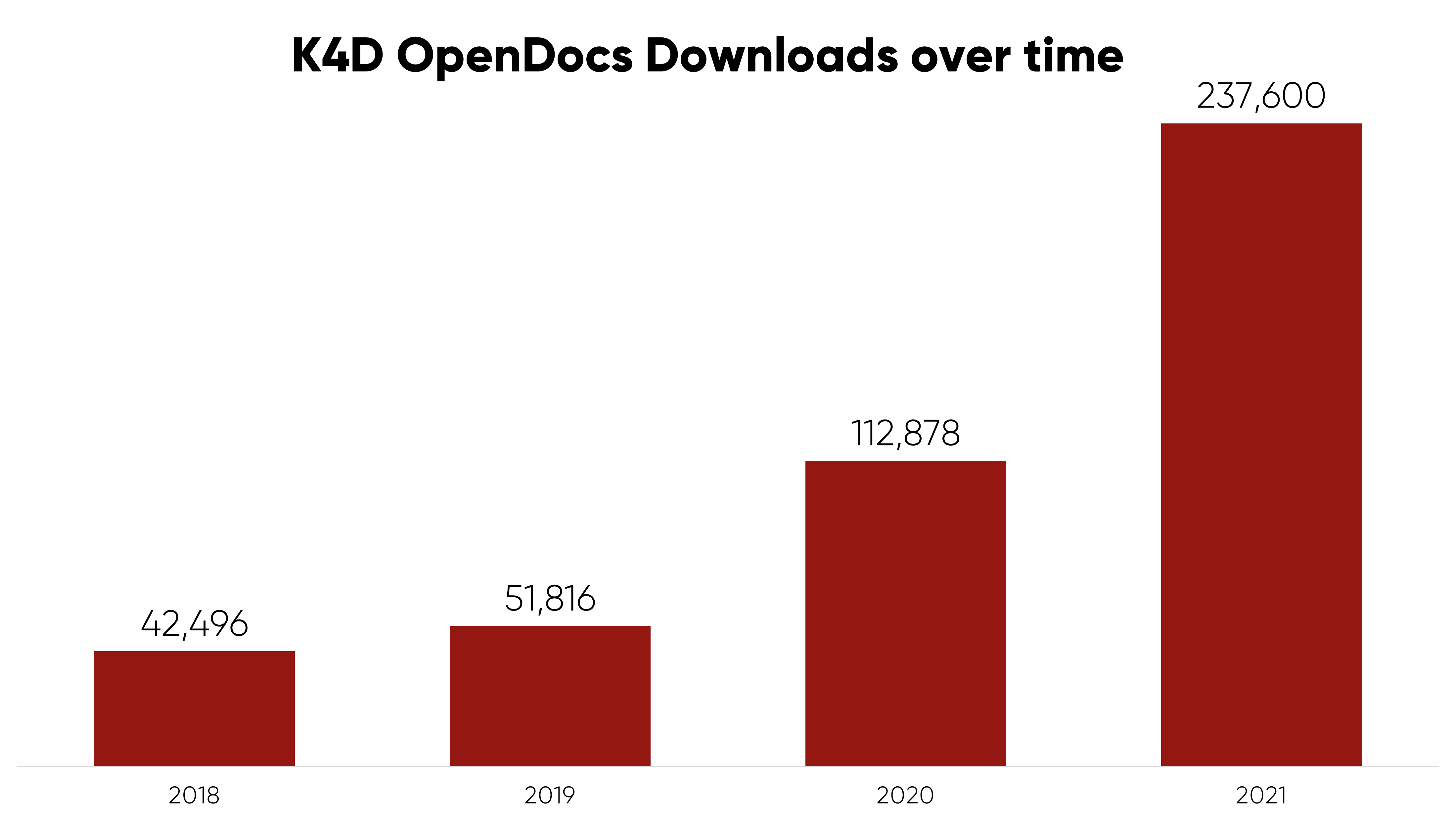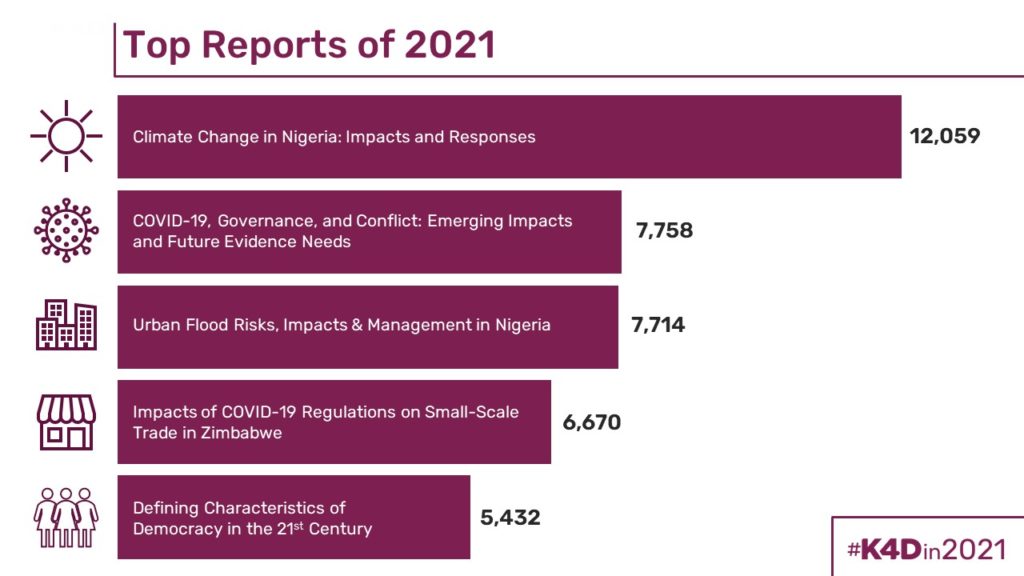2021 was a challenging year, both for the international development sector and for the world as a whole. The second year of the Covid-19 pandemic brought new development challenges and increased complexity. Significant cuts in general global Official Development Assistance (ODA) means that interventions need to be more targeted, prioritised and strategic. In this uncertain landscape, having accessible, reliable and timely evidence and learning is more important than ever.
The Knowledge, Evidence and Learning for Development (K4D) programme has continued producing rapid helpdesk reports and facilitating educational learning journeys for the Foreign Commonwealth and Development Office (FCDO) and its partners, sharing these outputs with the wider international development community.
We have summarised key moments through the #K4Din2021 Year in Review campaign, reflecting on our impact and achievements.
A Year of Milestones
K4D continued to adapt and deliver on its objectives despite the challenging context, with 2021 proving to be another successful year. There were a number of key milestones achieved which show how far the programme has come. Notably, in 2021 the research helpdesk completed its 1,000th helpdesk report; a report on Inclusion in Crisis Response, Recovery and Resilience by Becky Carter. We also launched the 40th Learning Journey, which included a learning event for FCDO titled ‘Evidence and learning for development impact – what works?’, which had over 100 attendees.
As K4D moves into its final nine months, these numbers continue to grow and exceed targets. We look forward to seeing where the programme will conclude as our focus will also turn to capturing the legacy of the programme as a whole.
Sharing Evidence and Learning Across Scales and Sectors
We also saw in 2021 the impact of K4D across sectors, scales and geographies. There were over 1,800 attendees to various Learning Journey events throughout the year, on themes ranging from water security to inclusion in crises, as well as systems thinking.
The most covered themes in publications in 2021 included Covid-19, conflict, climate change, gender, and the economy. While downloads of K4D resources has been growing over time since the programme’s inception, downloads of resources on OpenDocs more than doubled from 2020, with 237,600 downloads in 2021, as illustrated below. This growth speaks to the growing library of resources (which are available to public audiences), and the increasing influence K4D is having as a mechanism for knowledge, evidence and learning in the international development space.

Figure 1: OpenDocs downloads over time
Transcript of figure 1 information as shown in the image above:
| Year | K4D OpenDocs downloads |
|---|---|
| 2018 | 42,496 |
| 2019 | 51,816 |
| 2020 | 112,878 |
| 2021 | 237,600 |
Interestingly, the most downloaded report, which was on Climate Change in Nigeria, only accounted for 5% of total downloads for the year. This indicates that the engagement with K4D resources is not centred around one particular theme or paper, and speaks to the breadth of outputs that have been produced. In this infographic, we explore the top reports for the year.

The broad scope of resources that have been produced means that K4D is being picked up and utilised around the world by FCDO staff, non-governmental organisations, researchers, and others. While the most OpenDocs downloads were recorded in Europe (74,770), Africa was not far behind with 63,604 downloads. The top reports downloaded in Africa were about Climate Change in Nigeria, the Impacts of COVID-19 Regulatory Measures on Small-Scale and Informal Trade in Zimbabwe, and Defining the Characteristics of Democracy in the 21st Century. Contrastingly, in Asia the most downloaded reports covered topics such as diplomatic influence and border disputes and micro-conflicts in South and South-East Asia.
Throughout the #K4Din2021 campaign, we will be highlighting the top reports per region and theme, which provides an interesting snapshot into how different development issues affect various geographies.
Mobilising Evidence and Learning for Impact
We also spoke to researchers, FCDO staff and external partners about how the evidence and learning provided by K4D is impacting development work. As Mark Harvey, the Head of Profession (Infrastructure and Urban), describes:
“K4D is the resource we draw on for our 1,000+ advisors and other colleagues exploring difficult development issues. In 2021, K4D has had a huge impact on our response to the Covid-19 crisis by providing quality helpdesk reports, short evidence reviews, and a look at what was known.”
In 2021, we also saw the value of K4D’s work illustrated through engagement with external partners. This included supporting Water Witness with the signing of the Glasgow Declaration for Fair Water Footprints at COP26. Luke Kelly (a K4D researcher based at HCRI) also produced a helpdesk report and subsequent blog on Lessons Learnt from Humanitarian Negotiations with the Taliban,1996 to 2001 which was picked up by the Agency Coordinating Body for Afghan Relief and Development (ACBAR) – a consortium of civil society organisations in Afghanistan. The report was also translated into Dari, and Luke presented it to a body of humanitarian organisations in Afghanistan. Amina Agha, Advocacy and Communication Manager at ACBAR describes the impact of this work:
“This was a very timely release as NGOs have been struggling to negotiate with the current regime on various issues. When I read the report, I thought that it would really benefit ACBAR members to learn from the lessons when the Taliban were in power previously. Luke Kelly graciously agreed to give a detailed presentation on the findings of the report. K4D also proposed to translate the report into local language of Dari which was greatly appreciated by the NGOs. Both versions are available online.”
There are some other insightful reflections from the K4D team captured in these videos.
Towards a Legacy for K4D
The findings from our #K4Din2021 campaign illustrate that even in one year, K4D has played an important role in providing reliable, accurate and timely evidence and learning for development, assisting FCDO and organisations across the sector with navigating uncertain times. As we look towards the end of the programme in September 2022, there is no doubt that the impact of K4D’s work will extend well beyond the programme’s lifespan. We look forward to collating the outputs and impact that has been created over this period.
To keep up to date with the #K4Din2021 campaign, follow us on Twitter at @K4D_info.
